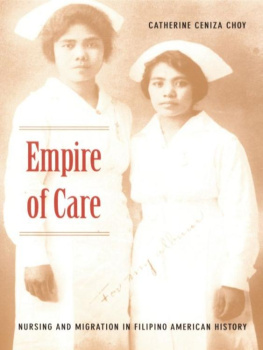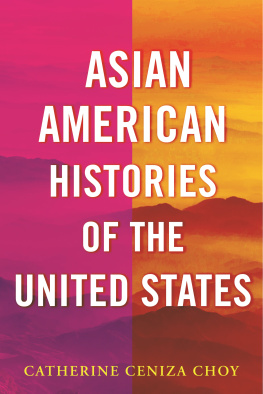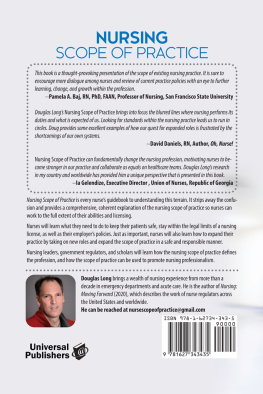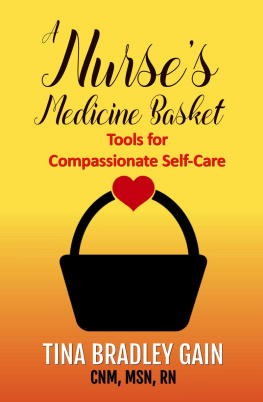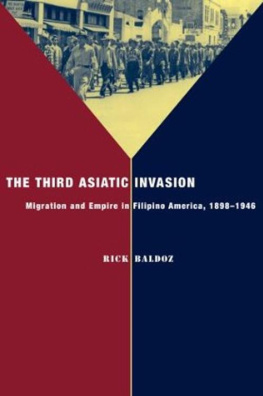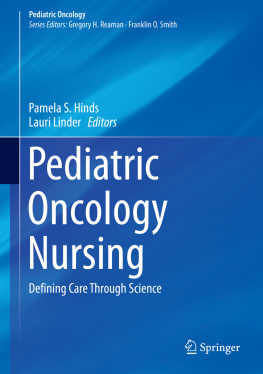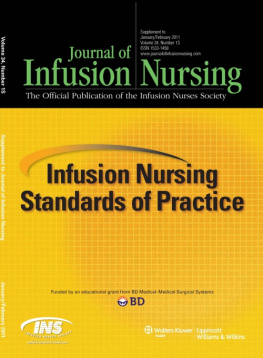ACKNOWLEDGMENTS
One of my most vivid memories of the research process for this book took place in my aunts apartment in New York City. The apartment was typically abuzz with the conversations of elders, adults, and children because it was the main gathering place for my family to have dinner, play Bingo, watch tv, and so on. However, it also happened to be the most convenient place to interview a Filipino nurse one evening. So that evening, my Lolo Braulio Ceniza, Lola Soledad Ceniza, Auntie Mary Hernandez, aunts Lucy Ceniza and Vicky Paragas, cousin Brian Paragas, and my mother patiently and quietly waited in a bedroom as I interviewed the nurse in the living room for over two hours. Although the interview went well, I felt bad for inconveniencing my family. However, when the interview was finally over, they emerged from the bedroom smiling, offering the nurse something to eat, and talking excitedly and proudly about the project. For me, this experience exemplifies the ways in which my research was inextricably linked to family and community support, and challenges the notion that this book is a product of individual merit.
The many solitary hours I spent in front of a computer writing this book belie the collective nature of this project, which the cooperation, encouragement, and support from numerous individuals and groups in the United States and the Philippines have enabled. This project began as a dissertation in uclas History Department, where I was privileged to work with Valerie Matsumoto, Michael Salman, and Karen Brodkin, whose mentorship and scholarship I have humbly tried to emulate and from whom I continue to seek guidance.
In more recent years, the camaraderie of my colleagues Brenda Child, Rod Ferguson, Elaine Tyler May, Lary May, Carol Miller, David Noble, Jeanie OBrien, Jennifer Pierce, Riv-Ellen Prell, and Gayle Graham Yates in the Department of American Studies at the University of Minnesota nurtured the development of this project into a book. I am especially grateful for their protection of my time during a year of research leave. My two faculty mentors, Elaine Tyler May and Josephine Lee, have been role models in every sense of the word, providing me with crucial insights for balancing scholarship, pedagogy, and family life.
When I first approached Duke University Press, I was fortunate to meet Ken Wissoker and I continue to be grateful for his enthusiasm for this project. Editors Valerie Millholland and Richard Morrison and assistant editor Miriam Angress skillfully guided this project throughout the editorial process. Natalie Kozin and Kay Robin Alexander helped me with securing the books illustrations and permissions. Two anonymous readers provided constructive feedback that greatly informed and improved the book.
This two-shores project depended on the cooperation and support of many individuals on both sides of the ocean. In the Philippines, the nursing faculty and students at Trinity College (formerly St. Lukes Hospital) School of Nursing welcomed me in their classrooms and libraries. Dean Fe Alcantara personally introduced me to deans of other nursing schools in Manila, professional nursing leaders, and hospital supervisors.
In the United States, I am indebted to the generosity of the forty-three Filipino nurses who shared their life stories with me. Between the time of my interviews and the writing of this book, two of these nurses, Purita Asperilla and Ofelia Boado, passed away. It is my hope that this book contributes to the preservation of their memory.
Phoebe Cabotaje-Andes, Tania Azores, Lolita Compas, Maria Couper, Enrique de la Cruz, Sue Englander, Carmen Galang, Filipinas Lowery, and Mila Velasquez shared personal collections of written material when no central archive about Filipino nurses and their histories existed. Dorothy and Fred Cordova located important documents about Filipino nurses in their Filipino American National Historical Society archives. My research assistants, Karla Erickson and Felicity Schaeffer, diligently helped me organize and sort through numerous secondary and primary materials.
Rick Bonus, John Cheng, Jigna Desai, Yen Le Espiritu, Deena Gonzalez, Erika Lee, Patrick McNamara, Vicente Rafael, David Roediger, Nayan Shah, Benjamin Tolosa, Helen Toribio, and Liping Wang provided insightful comments, suggestions, and questions at conferences, lectures, and other readings that strengthened the manuscript. I am grateful to Vicente Rafael for suggesting Empire of Care as the title of this book.
Several funding agencies and organizations supported the research and writing of this project. A Ford Foundation Postdoctoral Fellowship administered by the National Research Council and a University of Minnesota College of Liberal Arts National Fellowship Supplement provided an invaluable year of research leave to revise the book manuscript. John Kuo Wei Tchen graciously hosted my fellowship tenure at New York Universitys Asian/Pacific/American Studies Program and Institute. A Grant-in-Aid for Research, Artistry, and Scholarship, a Mc-Knight Summer Fellowship for the Arts and Humanities, and a Presidents Faculty Multicultural Research Award from various offices at the University of Minnesota, such as the Office of the Vice President for Research and Dean of the Graduate School, enabled research travel and other assistance for the later stages of the project. In its earlier stages, fellowships and grants from the Social Science Research Councils International Migration Program, Academy for Educational Development, uclas Institute of American Cultures and Center for the Study of Women, and the Consortium for a Strong Minority Presence at Liberal Arts Colleges Minority Scholar-in-Residence Program at Pomona College provided crucial financial support.
An earlier version of sections in Chapters 1 and 2 appeared as The Usual Subjects: Medicine, Nursing, and American Colonialism in the Philippines in the spring 1998 issue of

